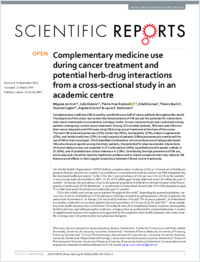Complementary medicine use during cancer treatment and potential herb-drug interactions from a cross-sectional study in an academic centre
- Jermini, Mégane Pharmacy Service, Geneva University Hospitals, Geneva, Switzerland - School of Pharmaceutical Sciences, University of Geneva, University of Lausanne, Geneva, Switzerland
- Dubois, Julie Center for Primary Care and Public Health (Unisanté), University of Lausanne, Switzerland - Institute of Family Medicine, University of Fribourg, Switzerland
- Rodondi, Pierre-Yves Center for Primary Care and Public Health (Unisanté), University of Lausanne, Switzerland - Institute of Family Medicine, University of Fribourg, Switzerland
- Zaman, Khalil Department of Oncology, Lausanne University Hospital, Lausanne, Switzerland
- Buclin, Thierry Clinical Pharmacology, Department of Laboratories, Lausanne University Hospital, Lausanne, Switzerland
- Csajka, Chantal Clinical Pharmacology, Department of Laboratories, Lausanne University Hospital, Lausanne, Switzerland - School of Pharmaceutical Sciences, University of Geneva, University of Lausanne, Geneva, Switzerland
- Orcurto, Angela Department of Oncology, Lausanne University Hospital, Lausanne, Switzerland
- Rothuizen, Laura E . Clinical Pharmacology, Department of Laboratories, Lausanne University Hospital, Lausanne, Switzerland
-
25.03.2019
Published in:
- Scientific Reports. - 2019, vol. 9, no. 1, p. 5078
English
Complementary medicine (CM) is used by one third to one half of cancer patients throughout the world. The objective of this study was to describe the prevalence of CM use and the potential for interactions with cancer treatments in an academic oncology centre. A cross-sectional study was conducted among patients undergoing current cancer treatment. Among 132 included patients, 56% had used CM since their cancer diagnosis and 45% were using CM during cancer treatment at the time of the survey. The main CM used were green tea (35%), herbal tea (35%), homeopathy (27%), dietary supplements (27%), and herbal medicines (27%). A small majority of patients (58%) spontaneously mentioned the use of CM to their oncologist. Of 42 identified combinations of concomitant use of biologically based CM and anticancer agents among the study patients, the potential for pharmacokinetic interactions of clinical relevance was not expected in 17 combinations (40%), hypothetical and deemed unlikely in 23 (55%), and of probable low clinical relevance in 2 (5%). Considering the high prevalence of CM use, active enquiries should be made by healthcare professionals to detect symptoms that may relate to CM tolerance and effects or that suggest interactions between CM and cancer treatments.
- Faculty
- Faculté des sciences et de médecine
- Department
- Master en médecine
- Language
-
- English
- Classification
- Medicine
- License
-
License undefined
- Identifiers
-
- RERO DOC 324677
- DOI 10.1038/s41598-019-41532-3
- Persistent URL
- https://folia.unifr.ch/unifr/documents/307784
Statistics
Document views: 148
File downloads:
- pdf: 214
